#because it's all austrian occupation
Explore tagged Tumblr posts
Text
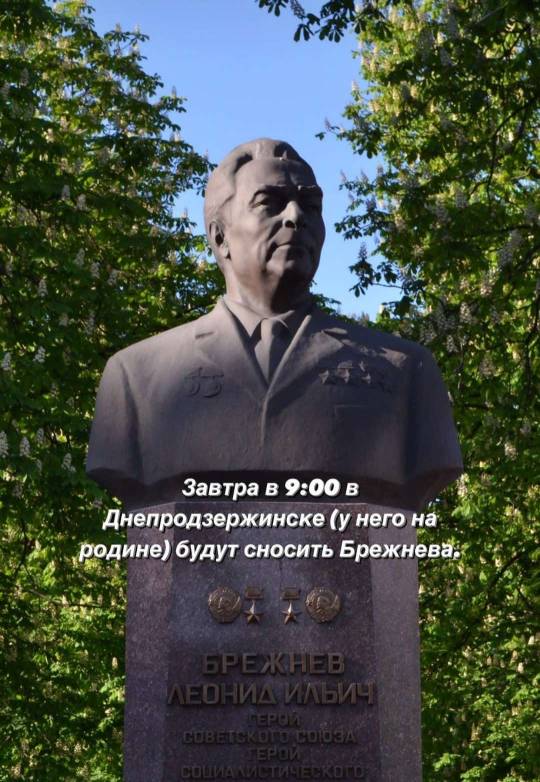

It is with heavy heart that the insanity has finally reached Leonid Brezhnev's hometown, Kamianske, will be dismantling their memorial to him tomorrow morning, 9:00 AM, July 27th 2023.
His entire life before coming to power was spent working in, and in the service of, the Ukrainian SSR. He rebuilt, renovated, and expanded the quality of life in Ukraine throughout most of his life.
It was he who built up the great city of Dnipro, kept Kyiv supplied and fed during the Second World War, who shielded his peers during the Great Purge, the only one who succeeded in relieving suffering during the 1946 famine, who restored Zaprozhie to prewar levels in incredible time and without terror. He never engaged in terror, he was one of the few who wholly and completely was engaged in his work with purpose and a cool head.
Like many others, his true identity was complicated. Sometimes calling himself a Ukrainian, sometimes Russian. Yet, he was a man loyal to his home above all.
Yet the iconoclastic fervor in the last year, this complete and total insanity, this call to completely revise and deny history, has come for Leonid in his home town.
There is no justification for this. No well reasoned, academic argument for this kind of collective denial, for anything other than immediate political gain and vanity.
#absolutely batshit#this is the culmination#fuck it#rip down your statues to korolev!#get rid of it all!#EVERYTHING SOVIET MUST GO#100%#EVEN THOSE WHO ARE LITERALLY YOUR OWN#just wholly and completely deny and discard EVERYTHING of 70 years of your national history#in which you were COMPLETELY and WHOLLY complicit in#this is like germans pretending the holy roman empire was never them#if they decided to destroy all of their history from this period#because it's all austrian occupation#despite literally being a fundamental member#ukraine IS the ussr#belarus IS the ussr#russia IS the ussr#they are the three sisters who were always at the center of this from the very beginning#fucking insanity#txt
9 notes
·
View notes
Note
Do you think the Nine Houses follow a Marxist, Keynsian, or Austrians economic model
this ask made me SO happy you have no idea! some vague thoughts
The Houses obviously have to do careful resource allocation. I doubt they have a free market economy, at least not on a system-wide scale. I could see some of the Houses — like the Third or Fifth Houses, which are by all accounts wealthy and with a very large population — develop some kind of internal capitalist economy within the House itself. Namely, private actors who control and own properties, wealth accumulation, competitive markets etc. But ultimately I think even those are subject to strong (local) governmental oversight because, again, they live on space installations in a situation of constant resource constraint. I bet there are quotas for everything.
However! No way ALL the Houses have a market economy. I'm thinking especially those Houses that are very small and/or have a "mission" which means that societal development is carefully planned, and probably the economy is also centrally planned. (Ninth, Eight, Sixth, maybe Second and/or Fourth).
On an overreaching scale (within the Home System) I don't think "the Empire" (as in, John) is overly concerned with the yearly economic development of the Houses, partly because he's been historically absent for decades or even centuries at a time. Verging sharply into headcanon territory, I think the closest thing the Houses have to a real centralised government is military leadership (High Command or the Fleet Admiral, who's the head of the Second House) and when it comes to issues that concern multiple Houses but are more "civilian" in nature, is kind of a free-for-all. I'm thinking about how Harrow thought that writing to ask for help would result in the Fifth or maybe the Third cannibalising the Ninth House — it looks like there's an informal council of House leaders, but no properly organised central government.
Trade: travel and commerce between the Houses is regulated. You can't just take a spaceship and move from the Eight to the Second, for example — movement of people as well as goods depends on a ship schedule that runs on "routes" and I'd bet there's an immigration/emigration quota that's maybe decided between specific House leaders, or maybe a third party. My best bet is that one of the Houses (possibly the Third or Fifth) OR an ad-hoc organisation (which includes multiple higher-ups from said well-off Houses) are the ones who regulate shipping and travel, and either have an ownership stake in the shipping system or administrate it in the name of the Emperor.
The shepherded planets: putting the "imperialism" in "Empire". The Houses definitely exploit their colony planet for resources, as per AYU (talking about the "contracts" that the Empire signs with the occupied planets). However, it's also worth noting that 1) for at least 5000 years, the House system was self-sustaining and hadn't made contact with any other population; and 2) stele travel is kind of a hassle, and only seems to be limited to Cohort ships that we know of.
What I'm getting at is that I think the economy of the Houses is not dependent on their war of conquest — imo it's more of a mission of conquest for conquest's sake, see Corona thinking that the economy of the Houses doesn't quite add up, and Augustine talking like the ongoing expansion of the Houses is a whim of John's and little else. Basically, it seems to be a way to oppress the occupied planet for occupation's sake, and I wouldn't be surprised if the resources the Houses extract from the conquered planets go straight into financing yet more war and occupation and very little (if any) of any wealth they may accumulate makes it back to the Houses.
It COULD be that there's a necromantic equivalent of the East India Company, and my bet would be on the Second administrating it — Harrow doesn't seem to rate them at all, which tracks because Harrow's primary concern is Houses that could be a threat to the Ninth, and the Second being focused on exploitation that's external to the Home System could be an explanation for that. I've also seen speculation that making money from colonialism is the Fifth House's purview (*) but EYE think it makes more sense if the House that are more strongly associated with running the war effort are also the ones making money from it. Or it could be a joint operation.
(*) never forget the iconic tag #we regret to inform you that spreadsheets dad is maybe running the necromantic East India Company @katakaluptastrophy here)
Anyway. Sorry I haven't answered your actual question! GUN TO MY HEAD, if I had to pick ONE economic model to map the Houses onto, I wanna say soviet type economy (think: centralised planning, no inflation, little to no unemployment, tendency towards black market, little to no innovation). I have thoughts about what the consumer needs market looks like in the Houses but nobody needs to hear that. Also, it's def very limited
If anyone has thoughts PLEASE feel free to jump in, I'm always thinking about the logistical side of space imperialism in the necro empire!
227 notes
·
View notes
Text

Now that the prisoners and displaced persons had been cleared from the area, it seemed to me that I had relaxed a bit during the past week. Keeping the troops occupied now became my biggest challenge, so I let the men concentrate chiefly on resting. In fact, I took a few afternoons off myself for mountain climbing and sunning. How lovely it was just to look at those snow-capped peaks and watch a cloud or two bump into an Alp. I had nothing more than my own men to worry about. They were such nice, quiet lads that they were really no trouble at all.
(Followed by almost immediately after:)
In a letter to Sergeant Forrest Guth, who was in England recuperating from a wound, Captain Speirs summarized the misfortunes that befell Easy Company in the first month of occupational duty. George Luz had fallen off a motorcycle and injured his arm. Sergeant Jim Alley was busted because of repeated drunkenness. Sergeant Darrell “Shifty” Powers was en route home to the States when the truck in which he was riding overturned. Powers, who had won a lottery ticket home, was hospitalized for the next year. Sergeant “Chuck” Grant caught a bullet in the head from a drunken American soldier and would have died had he not received immediate medical attention from an Austrian surgeon. To replace Grant as platoon sergeant, Speirs assigned Staff Sergeant Floyd Talbert, who had asked to be relieved from his duties as 1st Sergeant due to a personality conflict with Speirs. Staff Sergeant John C. Lynch from 2d Platoon replaced Talbert as company first sergeant.
~Dick Winters
#dick winters#Beyond Band of Brothers: The War Memoirs of Major Dick Winters#band of brothers#they were a tiny bit trouble Dick (not always their own doing) but i get how fond of them you were and how much you wanted them to alway#*always* be seen and thought of in a positive light and i love you for that! they were your men and you were proud and protective of them!#love that loyalty
20 notes
·
View notes
Text
"Stop it, get some help."
Y'all are out here victimizing the people of Palestine all because they're under a "genocide", yet y'all don't pay attention to the people of Poland, who are probably the toughest and most resilient people ever.
Polish people were invaded by Mongols, Czechs, Germans, Swedes, Russians, AND Austrians in their history, and managed to fend most of them off.
They even briefly occupied Moscow for some time (1610-1612). Even Napoleon Bonaparte and Adolf Hitler couldn't do what the Poles did! Sure, France did also occupy Moscow, but it only lasted a month, whereas the Polish-Lithuanian Commonwealth's occupation of Moscow lasted two years.
The Polish people didn't even have a nation from 1795 until 1918, that's a span of 123 years, and again from 1939 until 1945.
During their brief existence from 1918 to 1939, the Soviets invaded Poland in 1920 to try to occupy all of Poland, but failed trying to take Warsaw, so they had to retreat, giving Poland the victory.
While they were occupied by the Germans and Soviets, the Poles never accepted surrender, they fought relentlessly and eventually won their country back in 1945.
Although they had their own country back, they were under Communism from 1945 until 1991, which they wouldn't accept either. Multiple resistance movements were formed to counter communism, the most famous one probably being the trade union Solidarność ("Solidarity" in Polish). Again, the Poles won against Communism through determination in 1991.
Nowadays, you don't see them complaining about donations, since they're doing fine, even with all their struggles in the past. When Palestine is attacked by Israel, even if Israel is doing it to defend themselves, the best you can do is DONATIONS? If you're really adamant for Palestinians' safety, why don't you go fly over to Gaza or Rafah and directly help them instead of relying on online donations like a little bitch?
And I'll end my rant with this question to Palestine supporters: Why do you support Palestine? Is it because they're really going under struggles (that were Hamas's fault, not Israel's), or is it simply because "they're not christian!"?
4 notes
·
View notes
Text


[ … ] ❀ you’re not from around here , are you ? i figured because you totally just missed sloane lombardo walking by . don’t tell me you don’t know who she is ? they kind of look like ashton wood and i could be wrong but i think that they might be twenty nine years old right now . they’ve been living in palmview for the last two years . and i don’t know if anyone has ever told them this before but they kind of remind me of alexis rose from schitt's creek . if you stick around the town long enough you might catch them in action working at pearl's seafood bistro as a receptionist . you see this town isn’t really that big of a place , some folks like to call them the fallen princess of palmview ! they took a liking to the name too after a while , go figure . oh crap , they must have heard me yapping . they’re coming this way . i got to warn you though , rumor has it they can pretty vain at times . i wouldn’t take it too seriously though , from the times i’ve spoken to them they seemed pretty vivacious to me . we see each other all the time since they live in that one bedroom apartment beside me over in sunny shores . i better leave you to it . it was nice meeting you !
𝐨𝐧𝐞 , 𝐛𝐚𝐬𝐢𝐜𝐬
full name , sloane amelia lombardo . nicknames , her close friends call her s . date of birth , june 10th . age , twenty nine . hometown , sydney , australia . sexuality , bisexual . occupation , receptionist . label , the fallen princess . counterpart , alexis rose from schitt's creek . zodiac sign , gemini .
𝐭𝐰𝐨 , 𝐛𝐢𝐨𝐠𝐫𝐚𝐩𝐡𝐲
sloane lombardo was austrian royalty , with both of her parents being famous and rich people in high society , being a socialite was basically imposed under her from the moment her mom found she was pregnant . tt was obvious that she would turn her even born daughter' life into a spectacle , it was what she did best . heiress and socialite, followed own mother's footsteps and hoped her daughter would continue the tradition . and so sloane did .
to say that she was forced to have that life was an exaggeration , especially since Sloane loved every minute of it . and she played the part masterfully . until she meets her future ex fiance . her parents were proud , liam was an ambitious young man , with a wealthy family and loved sloane with every beat of his heart . sloane blindly believed that this was the man of her life . never a romantic , but now thought she found the one . until the day she caught him with his face between his secretary' legs . a real shame . especially because he never went down on her .
sloane wasn't proud of what she did next , possessed by the anger of years thrown away with someone who clearly didn't deserve her and for having her heart broken , she destroyed his car . in a very public and viral moment . the video had been watched thousands of times from her breaking the windows of the car with an umbrella she stole from a bystander to the moment one of the security guards tried to contain her . enough to make her an internet icon for fifteen minutes , enough to be exiled by her parents .
she ended up in palmview thanks to a friend whose family had a vacation home there and let her stay there for a while . with her frozen account and without her credit cards , sloane had to learn to be on her own . from dog walker to babysitter, she tried many jobs that required no experience or credentials . being a receptionist at pearl's seafood bistro being the current one .
now living two years in the beach town , sloane still tries to learn to live on her own , finding out how to make the washing machine work or what taxes are . she moved from her friend's house and started paying her own rent . and even if this is far from her ideal plan , she's starting to get used to her new life .
5 notes
·
View notes
Note
if it isnt personal, would you mind to share us your ethnics backgrounds history ? It is just that you have a really intersting mix and wondered how it worked out 😅
Anon I am so glad you asked because I love talking about my culture/family history and you’ve just opened floodgates
Firstly I’d like to specify that this is ONLY my dad’s side. My mother’s side immigrated to the US a very long long time ago during the colonial period, left their culture behind, and it was abandoned long before my time. I know where they’re all from, I know specific Scottish clans (and I love learning about them!!!) but I do not claim those cultures because I did not grow up with them, and my mother weaponises them a long and I don’t want to do the same thing.
To add on, my mother’s family lives in another state (my father is from Michigan, that’s where I was raised, my mother’s family is all several states away) so I was primarily raised by, watched by, and grew up around my dad’s family. That’s whose traditions I mostly practiced, whose food I ate, whose holidays I celebrated, whose stories I heard, and whose languages I heard
NOW TO THE ACTUAL HISTORY
My dedo (grandfather) and his family came from Aegean Macedonia, which is currently occupied by Greece. His father came from the village of Buf (renamed to Akrítas) in Lerinsko Pole, and his mother came from the city of Lerin (renamed to Flórinas). My pradedo was mixed Turkish as well from the time of Ottoman occupation, and while Macedonian culture and tradition was first and foremost, they still brought down certain Turkish traditions, language (mostly certain words), cuisine, and certain habits. Though from that side they were definitely dominated by the Macedonian culture.
My family fled Macedonia during the genocide, my pradedo first leaving in 1936 for the United States to get established in Detroit before my prababa and teta fled two years later to join him. Previously one of my uncles (pradedo’s brother) had left in 1912.
Unfortunately there’s not much left in the way of documentation, either it was left behind to be destroyed by Greek occupiers or it straight up doesn’t exist (my relatives were severely impoverished and were unable to afford things like photographs, many books, or anything else). I have my prababa’s passport and that’s all.
To my babcia’s side, they all came from Poland. Different parts of Poland and they belonged to different ethnic groups within Poland, but they were mostly all from Poland (with exceptions of some others marrying into the family, my babcia’s grandfather was half Austrian but I’m not sure which of his parents was Austrian).
My babcia’s father (I’ve always just heard him referred to as dziadzia) was mixed Ashkenazi Jewish and Kashubian, mostly. My Ashkenazi family came from Pałuki region in Kujawsko-Pomorskie/Wielkopolskie in places like Żnin (city and region), Szelejewo, Gąsawa, Wenecja, and Kłecko. But also they later left to Łomża in Podlasie, which is where he directly immigrated from. Kashubian family came from Pomorskie, specifically Rogawica.
My babcia’s mother (who I’ve always heard referred to as babki) was just Polish to my knowledge, and they came from Warsaw, Kraków, and possibly some other places but surprisingly they aren’t as well documented. Though they did bring a lot of culture from especially Kraków as a lot of my relatives are or were krakowiak dancers, but also I still have relatives living there (though I’ve not actually met them, one of my cousins frequently visits them).
I wasn’t raided religiously Jewish (secular Jew) but raised with a lot of the Polish-Jewish culture, mindsets/ideologies, and generally I think I’m lucky as much of that culture survived as it did.
Generally if people ask I’ll keep it primarily to Macedonian and Polish since those were the dominant cultures in my life, but I’m so proud of all of them. My family went through much hardship being who they were, where they were, and especially with much cultural damage done by occupiers (like Germans/Prussians, Russians, Greeks), or done by their immigration to the US, I love to keep the culture alive as much as I see it dwindling year by year in my relatives
I think the biggest difficulty has been the language, because I was never actually taught the languages so it’s a struggle, especially with me now living in Poland, but I do my best. Even growing up in the US my relatives were somewhat poor, or lower-middle class, so nobody was ever able to afford leaving the country to visit Poland or Macedonia, so moving here has been such a long time coming and so fulfilling for me.
Anyway thank you for the question, I know that was long but I simply love talking about my culture haha
#Diaspora#Poland#Macedonia#Turkey#Polska#Македонија#Türkiye#Culture#Family History#It doesn’t make sense to a lot of people but that’s ok#I love love love my culture so much thank you for asking#I have made it my personality
5 notes
·
View notes
Text
Deutschribing Germany
History
During most of its history, Germany was divided into several duchies, principalities, free cities, and ecclesiastical states.
Prehistory and ancient history
Germany is famous for the discovery of Homo neanderthalensis bones, as well as for having the oldest complete set of hunting weapons in the world, the oldest figurative work of art (Löwenmensch figurine), and the oldest figurative object (Venus of Hohle Fels). The latter two are attributed to the Aurignacian culture.
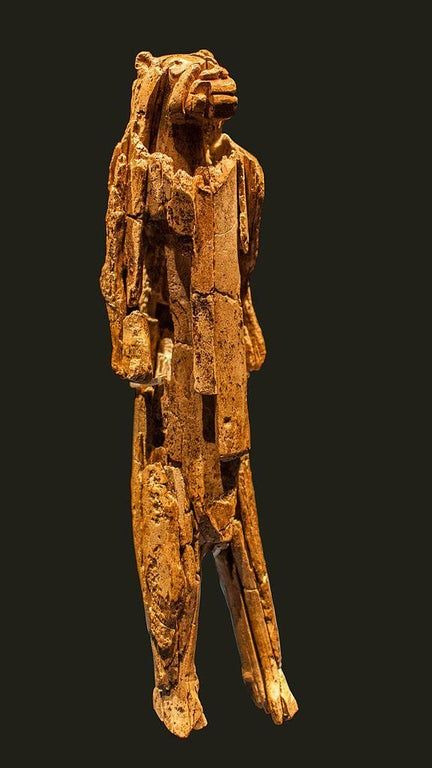
The country’s ancient history is characterized by the expansion of Germanic peoples, including the Alemanni, Franks, Goths, and Saxons. Around the same time, the Roman Empire started to invade Germanic lands, creating the province of Germania between the Rhine and Elbe rivers. Eastern Germany was inhabited by Western Slavic tribes.
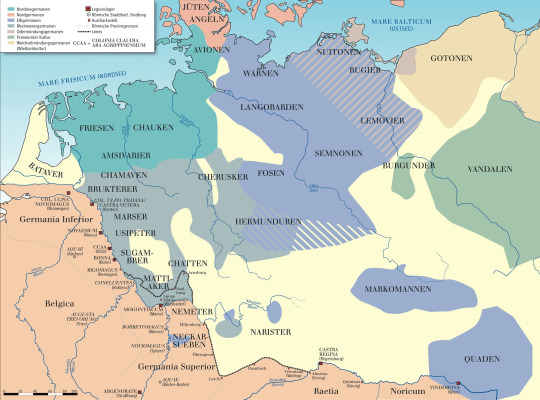
Middle Ages
The most powerful Germanic tribe, the Franks, eventually conquered many of the others, and in 800, their king Charlemagne founded the Carolingian Empire, which was later succeeded by the Holy Roman Empire, absorbing northern Italy and Burgundy.
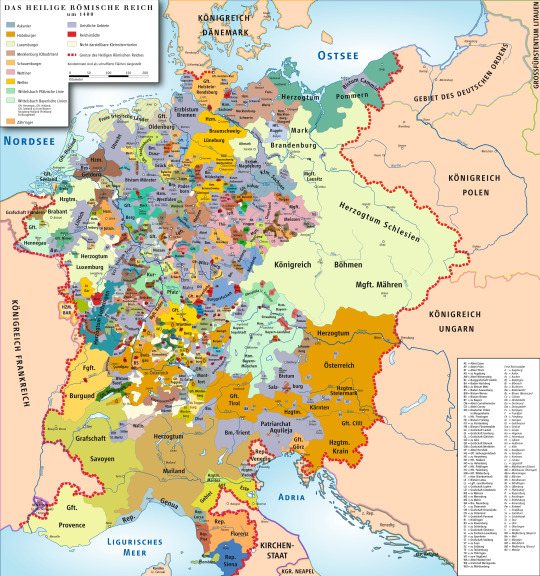
Meanwhile, north German towns in the Hanseatic League prospered thanks to trade. This dynamic climate was the background for the invention of the printing press by Johannes Gutenberg.
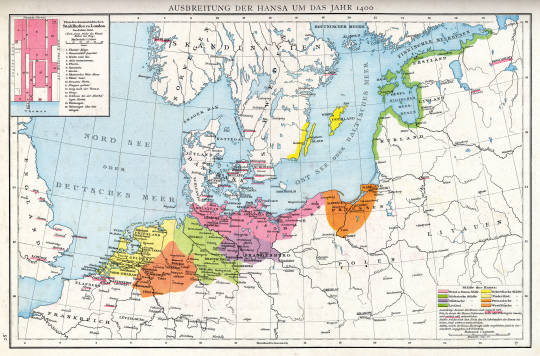
Modern history
Germany’s modern history is characterized by division, first due to religion and then as a result of the fight for political power. Following Martin Luther’s Protestant Reformation in 1517, religious conflict between Roman Catholics, Lutherans, and Calvinists devastated the country, especially during the Thirty Years’ War (1618-1648). The Peace of Westphalia ended religious warfare by allowing each state in the Holy Roman Empire to choose their official religion.
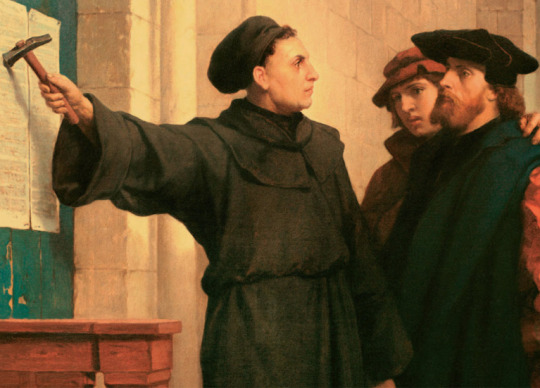
During the following two centuries, the Austrian Habsburg monarchy and the Kingdom of Prussia fought for dominance, eventually annexing free cities and ecclesiastical territories. Together with France and Russia, they competed for hegemony in present-day Germany during the Napoleonic Wars.
Following the fall of Napoleon, the 1815 Congress of Vienna founded the German Confederation, with the Austrian emperor as the permanent president. The revolutions of 1848 led to the rise of the German question, and King Frederick William IV of Prussia was offered the title of emperor but rejected it. In 1862, Otto von Bismarck was appointed as the Minister-President of Prussia and eventually defeated Austria and France. After the latter defeat, the German Empire was founded in 1871, with Prussia as the dominant constituent state and Bismarck forging alliances with Austria-Hungary and Italy.
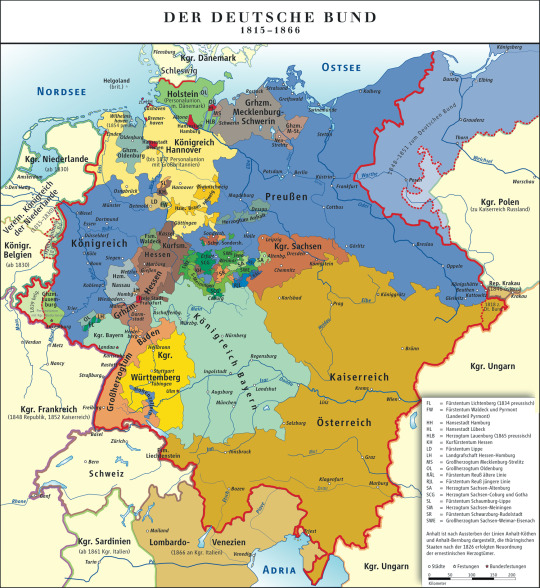
Contemporary history
When Archduke Franz Ferdinand of Austria was assassinated in 1914, Austria-Hungary declared war on Serbia, triggering World War I, which ended with Germany’s defeat and the Treaty of Versailles of 1919, because of which it lost many European territories and all of its possessions in Africa and the Pacific. The humiliation brought about by the Treaty is seen as influential in the rise of Adolf Hitler.
After the war, the Weimar Republic was established, during which there was a period of political instability and hyperinflation. The Nazi Party led by Hitler rose to power in 1932 as a result of high unemployment levels caused by the austerity and deflation policies put in place following the Great Depression. In 1933, Hitler obtained unrestricted legislative power and Germany became a totalitarian state. The regime created concentration camps for the internment of minorities, such as the Jews, Romani people, disabled people, homosexuals, and political opponents, rearmed its army, and implemented a program for economic renewal. In 1939, Germany invaded Poland, a move that started World War II. Following Hitler’s suicide, Germany surrendered, and the war ended.
The Allies, which had won the war, divided the country and its capital city into four occupation zones. In 1949, the western sectors, controlled by France, the United Kingdom, and the United States merged to form the Federal Republic of Germany (Bundesrepublik Deutschland) or West Germany. The Soviet zone became the German Democratic Republic (Deutsche Demokratische Republik) or East Germany. Konrad Adenauer was elected the first federal chancellor that same year. Both German states were reunified on October 3, 1990, following the fall of the Berlin Wall. East Germany joined the European Union as part of united Germany.
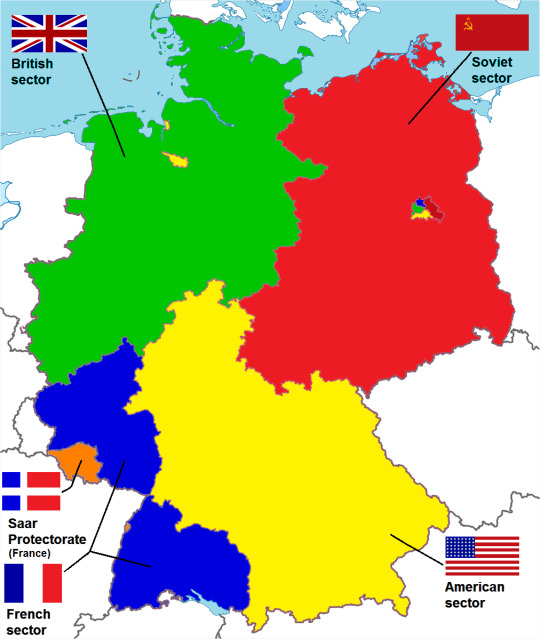
In the 2005 elections, Angela Merkel became the first female chancellor. She ruled the country until 2021.

4 notes
·
View notes
Text

THE DESCRIPTION OF SAINT MARKO KRIZIN (KRIŽEVČANIN) Feast Day: September 7
Marko Križevčanin (aka Marko Stjepan Krizin or Mark of Križevci) was born in Križevci, a town in the northern part in the Kingdom of Croatia. He started his studies in the Jesuit college in Vienna, and then later at the University of Graz, where he became a Doctor of Philosophy.
As a candidate for Holy Orders of the Diocese of Zagreb, Krizin then moved to Rome, where he attended the famous Collegium Germanicum et Hungaricum. He personally noted his nationality as Croatian in a document which is available in the college archives.
As a student, he was smart and considerate. He studied there from 1611 to 1615.
After his ordination as a priest, Krizin returned to his diocese, where he stayed only a short while. Cardinal Péter Pázmány, the Archbishop of Esztergom (then living in Nagyszombat – present-day Trnava – because of the continuing Ottoman occupation of much of Hungary), called him from Zagreb and appointed him both rector of the local seminary and canon of the cathedral chapter.
In early 1619, Krizin was sent to administer the estate of the former Benedictine Abbey of Széplak, near Kassa, Hungary (now Košice, Slovakia). Around the same time, Gábor Bethlen, the Calvinist Prince of Transylvania, led a nationalist uprising against the Austrian Habsburgs, who then ruled Hungary.
At the time, Kassa was a stronghold of Calvinism for Hungary. To strengthen the position of the Catholic minority, the governor of the city, Andrija Dóczi, a Catholic appointed by Emperor Matthias, brought two priests to Kassa: István Pongrácz, a Hungarian Jesuit priest and Melchior Grodziecki, a Silesian Jesuit priest.
Their presence caused unrest among the Calvinist majority of Kassa.
The Calvinists then incited a rebellion on July 13, 1619, falsely accusing the Catholic minority of arson. That following September, the city came under siege by the forces of the commander of the Calvinist army, George I Rákóczi. On September 5, Dóczi was betrayed by the mercenary forces defending the city and was handed over by the city authorities to him.
His Protestant supporters then declared Bethlen 'head' of Hungary and the protector of the Protestants.
At that time, Marko was staying at the then-Jesuit Church of the Holy Trinity, in the company of the two Jesuits ministering to the Catholics of the city. The Calvinist troops arrested the three priests at once. They were then left without food and water for three days.
During this time, the fate of the Catholic population was being determined. At the instigation of a Calvinist minister named Alvinczi, the head of the City Council, Reyner, was demanding the execution of all Catholics of the city. The majority of Protestants, however, were opposed to such a slaughter. The execution of the priests, however, was approved by them.
The commander promised Marko Krizin a church estate, if he renounced the Catholic Church and converted to Calvinism. Krizin refused. All three were then tortured and soon beheaded. It was September 7, 1619. The news about their martyrdom stormed across Hungary, shocking both Catholics and Protestants alike.
Despite many pleas, Prince Gabriel refused to allow them to be buried them in consecrated ground. Only after being asked by Countess Katalina Pálffy, six months later, did he allow them to have a proper burial.
The three priests were beatified on January 15, 1905 by Pope Pius X. The canonization of the three Košice martyrs was proclaimed by Pope St. John Paul II on July 2, 1995 in Košice.
The remains of the Košice martyrs now rest in various locations, including the Basilica of Esztergom and the Ursuline Church of St. Anna in Trnava.
#random stuff#catholic#catholic saints#jesuits#society of jesus#marko krizin#marko križevčanin#marko stjepan krizin#mark of križevci
1 note
·
View note
Text
Watching WayneRadioTV's Palestine fundraiser (https://www.twitch.tv/wayneradiotv) and I really have been thinking about this - I hear all the time people saying 'I can't believe Israel would do this, after what Jewish people went through with the Holocaust.'
But I really, really think this happened more because of the Holocaust rather than despite it.
The Holocaust, while only(and I only use that word for lack of a better word here, I am not minimizing the numbers) 35% of the Holocaust's victims were Jewish (6mil to the total 17mil), because they were the main target, it has created a seemingly irreparable rift among Jewish communities toward non-Jewish people in a way that is really only seen in that demographic.
It created a belief that Jewish people need their own country to protect themselves based on the belief that a Holocaust will happen again. That they can only rely on themselves and that non-Jewish people are always a distrustful other. I think you can even see this in smaller ways the way you'll occasionally see Jewish users online, particularly Tumblr, talk about goy in dismissive ways.
But the belief is fundamentally flawed.
Number one, borders did not stop the Nazis. Borders never stops genocide and discrimination. I am a Slav. My Papi fought against the Nazis as they invaded Croatia with the intention of wiping out Slavs to create 'living room' for the Aryan race. He ended up in a concentration camp. If the Nazis had won, Slavs would have been slaughtered, as we were deemed lesser humans too, and Hitler only put us off on the basis that we were too stupid to pose a problem and were thus put on the backburner.
We live especially in an era where people in countries that aren't even formally at war get slaughtered by bombs from aggressor nations that know they are safe from retaliation. Even if not a genocide, countries like Syria, Yemen, etc are constantly bombed. Civilians are constantly killed. Borders has never protected people. If a group of people want to kill another, they will find a way.
Number two, 'we deserve a country to protect ourselves' is an irrational thought that ONLY applies to Judaism due to Zionism. It comes from a common argument from ethnic groups that want independence in their own land that is being colonized, but Israel had to be invented. This was not a matter of being released from colonization, this was 'we deserve this because of what the West did.' As I said before, 35% of the Holocaust's victims were Jewish. Among the other victims were Romani, whose numbers are largely disputed.
Per the National WWII Museum in New Orleans, "Existing data confirm that of those living in Greater Germany in 1939, about 70 percent of German, 80 percent of Austrian, and as many as 90 percent of Czech Sinti and Roma perished. Of territories subject to German occupation and domination, Poland lost around 45 percent, Ukraine 75 percent, Estonia 90 percent, Latvia 60 percent, and the remaining Soviet Union 35 percent of their Romani populations as a direct result of the persecution. "
Up to 90% in many of those countries. That is an insane number.
And yet if the Roma were to call for their own nation, would it be taking seriously? Of course not. Western nations forcing India to give up part of its land on the basis of a thousands-year-old Indian homeland for the Roma would never happen. And yet it is expected that we treat the Israeli state as a rational solution to a complex problem.
And I do not think that it would be expected, would it not be for the Holocaust leading to such levels of distrust that the belief among Jewish communities that 'we will never be safe unless we have our own nation' is common. So I don't think this is a matter of "This is happening despite the Holocaust," but rather because of it.
0 notes
Text
In the 20th century.
Biography of translators in the 20th century.

Tadeusz Boy-Żeleński (1874-1941), a Polish poet, translated more than 100 French literary classics, including works by poet Fran��ois Villon, by writers Rabelais and La Rochefoucauld, by philosophers Montaigne and Montesquieu, by novelists Stendhal, Balzac and Proust, by playwrights Molière, Racine, Marivaux and Beaumarchais, and by philosophers Voltaire, Descartes and Pascal. He was murdered in July 1941 during the Nazi occupation of Poland, together with 24 other Polish professors, in what became known as the massacre of Lviv professors (Lviv is now in Ukraine).
Zenobia Camprubi (1887-1956), a Spanish feminist writer, was the first translator of Bengali writer Rabindranath Tagore’s works into Spanish, and translated 22 works by Tagore (collections of poems, short stories, plays) over the years. Married to Spanish poet Juan Ramón Jiménez, she was a pioneer of feminism for actively promoting women in society in all the places where she lived (Spain, Cuba, the United States, Puerto Rico).
James Strachey (1887-1967), an English psychoanalyst, translated with his wife Alix Strachey (1892-1973) all the works of Austrian psychoanalyst Sigmund Freud after moving to Vienna, Austria. The 24-volume translation was published by Hogarth Press in London under the title “The Standard Edition of the Complete Psychological Works of Sigmund Freud”, with introductions to Freud’s various works, and extensive bibliographical and historical footnotes. It became the reference edition of Freud’s works in English, as well as a reference work for translations into other languages.
Boris Pasternak (1890-1960), a Russian writer, turned to translation to provide for his family after being vilified for his refusal to glorify communist values in his writings. He translated works by German poets Goethe, Rilke and Schiller, by French poet Verlaine, by Spanish dramatist Calderón de la Barca, and by English playwright Shakespeare. Because of their colloquial and modernised dialogues, his translations of Shakespeare’s plays were more popular with Russian audiences than translations by Russian writers Mikhail Lozinsky (1886-1955) and Samuil Marshak (1887-1964).
Jorge Luis Borges (1899-1986), an Argentine writer, translated into Spanish — while subtly transforming — works by English writers Rudyard Kipling and Virginia Woolf, by American writers William Faulkner, Edgar Allan Poe and Walt Whitman, by German writers Hermann Hesse and Franz Kafka, by French writer André Gide, and by others. He also wrote and lectured extensively on the art of translation.
Charlotte H. Bruner (1917-1999), an American scholar, translated works by African French women writers for them to reach a wider audience. With her husband David Kincaid, she spent one year in Africa interviewing these women writers, and aired these interviews after their return to the United States. She was a pioneer in African studies and in world literature at a time when American universities mainly taught European literature.
Simin Daneshvar (1921-2012), an Iranian writer, and Jalal Al-e-Ahmad (1923-1969), an Iranian philosopher, translated many literary works into Persian. Simin Daneshvar translated works by Russian writers Anton Chekhov and Maxim Gorki, by American writer Nathaniel Hawthorne, by Austrian writer Arthur Schnitzler, by Armenian-American writer William Saroyan and by South African writer Alan Paton. Jalal Al-e-Ahmad translated works by Russian novelist Fyodor Dostoyevsky and by French writers Albert Camus, Jean-Paul Sartre, André Gide and Eugène Ionesco.
1 note
·
View note
Text
Magnussen has a fight on his hands after change of team mate | 2023 F1 team mate battles
The notorious run-in between Kevin Magnussen and Nico Hulkenberg at the 2017 Hungarian Grand Prix led some to expect fireworks between Haas’ latest driver pairing. So far, nothing like that has materialised. Indeed, Hulkenberg must be relieved not only to have the opportunity to resume his Formula 1 career four years after it seemingly ended, but against a driver he appears to have the measure of so far. It’s easy to forget neither of these drivers started an F1 race during 2021, the pair’s careers seemingly over. Magnussen’s return came thanks to Nikita Mazepin’s ejection from Haas, and once he showed Mick Schumacher the way the door swung open for Hulkenberg to join him. But from the off Magnussen has struggled to extract the best from the VF-23 over a single lap. That’s a problem, because the car’s only strength appears to be its qualifying pace. Hulkenberg has taken most of Haas’ points so far Hulkenberg has consistently achieved better grid positions than his team mate. The Haas chews its tyres in races, so they tend towards similar finishing positions. However Hulkenberg was able to claim sixth place in the sprint race at the Austrian Grand Prix after qualifying a remarkable fourth. Kevin Magnussen delivered their best qualifying position for a grand prix in Miami and converted it into 10th place. This was very much against the run of play, but was a reminder he hasn’t lost his touch. Magnussen freely admits he has found it hard to understand why he hasn’t been able to make his car work as well in qualifying as his team mate can. However Haas have often used Magnussen’s car to assess set-up changes on Fridays, only to revert to Hulkenberg’s set-up for qualifying, which hasn’t helped matters for the occupant of number 20. Reliability has been a particular problem for Haas as well. This compromised Hulkenberg’s weekend at Spa, halted him in Austria where he qualified eighth, and ruined Magnussen’s British Grand Prix. Last year, when Haas was preparing to drop Schumacher, team principal Guenther Steiner said he felt Magnussen needed a stronger team mate to motivate him to keep delivering his best. It seems that concern was well-founded, and as Steiner has lavished praise on Hulkenberg’s one-lap pace, Magnussen will go into the second half of the season in no doubt over where he must improve. Advert | Become a RaceFans supporter and go ad-free BAH SAU AUS AZE MIA MON SPA CAN AUT GBR HUN BEL Magnussen Q R Advert | Become a RaceFans supporter and go ad-free Unrepresentative comparisons omitted. Negative value: Magnussen was faster; Positive value: Hulkenberg was faster 2023 F1 season Browse all 2023 F1 season articles via RaceFans - Independent Motorsport Coverage https://racefans.net/
#F1#Magnussen has a fight on his hands after change of team mate | 2023 F1 team mate battles#Formula 1
1 note
·
View note
Text
June 5 2022 Lafayette and Boulder

Today at our Bouldlder Valley Unitarian Universalist Fellowship (BVUUF) Sunday service it was Flower Communion Sunday. This is one of my favorite services of the year. It was lovely to see all the flowers everyone had brought, all the different shapes and colors. It is a tradition celebrated by Unitarian Universalists around the world in honor and memory of Norbert Capek and the amazing example of the strong spirit of this great man who was killed by the Nazis during the occupation of Czechoslovakia. While the story of Norbert Capek is tragic and sad his legacy is uplifting and beautiful.

According to the Harvard Square Library:
“Norbert Fabian Čapek was born June 3, 1870 in the village of Radomysl in Bohemia (then a part of the Austro-Hungarian Empire). He was a raised as a Roman Catholic (then the dominant state-supported religion), but became a Baptist at the age of eighteen, and soon thereafter began a career as a minister, missionary, publicist, and composer of hymns. He served a congregation in Saxony for three years, then moved to Moravia, where he established a new congregation. In 1901 he was elected chair of the Union of Baptist Churches of Moravia and Slovakia. He published religious journals and became the assistant editor of a popular literary magazine. His religious stance became increasingly liberal, influenced by the “social gospel” movement of Walter Rauschenbausch and by the study of radical Christian movements in Czech religious history.
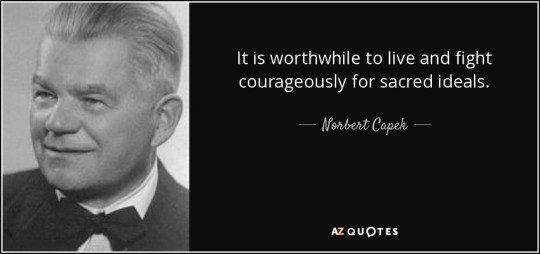
Čapek first became interested in Unitarianism in 1910, as a result of a meeting with Tomas Masaryk (then a professor, later to be President of Czechoslovakia). Čapek tried that year, without success, to get the American Unitarian Association to support his efforts to promote liberal religion.
At the beginning of World War I in 1914, Čapek moved to the United States, after being advised that he was in danger of arrest by Austrian authorities because of his nationalistic and anti-Catholic writings, Early in 1915 he was tried for heresy by a Baptist tribunal, but acquitted, and for the next three years he was pastor of the First Slovak Baptist Church in Newark. During this time he organized an alliance of the various Slovak associations in New Jersey, and was active in the movement for Czechoslovak independence.”
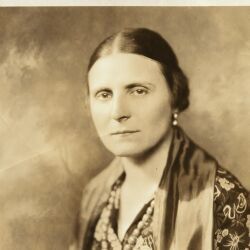
From the First Unitarian Church of Essex County website:
Maja V. Oktavec, born April 8, 1888 in Bohemia, came to the United States in 1907, obtained a degree from the Columbia University School of Library Science, and in 1909 went to work at the Webster Branch of the New York Public Library. In 1914 she was put in charge of its Czech section. There she met Norbert Čapek. They were married June 23, 1917. (Čapek had already been married and widowed twice, and had nine children.) Maja resigned her position at the library a week after their marriage. They bought a home in Belleville, and in 1919 Čapek became pastor of a small congregation there. But in September of that year, having come to the conclusion that he could no longer be a Baptist, he resigned his pastorate.”
From the Harvard Square Library:
“At the end of World War I, Czechoslovakia became independent, and many Czechs decided to leave the Roman Catholic church. Čapek was eager to return to his native land and play a part in its spiritual reawakening....He and Maja... had joined First Unitarian Church of Essex County... The minister, Dr. Walter Reid Hunt, learning of Čapek’s intent to return to Czechoslovakia, arranged for him to meet the president of the American Unitarian Association, Dr. Samuel A. Eliot. By May, Čapek had a commitment from the AUA to support his work in Czechoslovakia...He and Maja embarked for Europe June 30.”
From the First Unitarian Church of Essex County website:
“By February 1922, Čapek had organized the Prague Congregation of Liberal Religious Fellowship, and the services were soon drawing standing-room-only crowds. On June 24, 1923, the first Flower Communion was celebrated. Maja was ordained as a minister in 1926. For several years the fellowship met in rented halls. With financial help from the AUA and the British and Foreign Unitarian Association, they acquired and renovated a medieval palace. In 1930 the Unitarian Church of Czechoslovakia was officially recognized by the Czech government.
In 1939, shortly before the German occupation of Czechoslovakia, Maja Čapek left for the United States to lecture and raise funds for a joint Unitarian-Friends program to assist endangered refugees and internees.

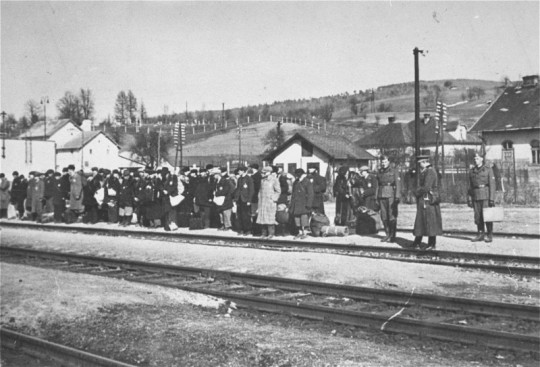
On March 28, 1941, Čapek and his youngest daughter Zora were arrested by the Gestapo. They were convicted of listening to foreign radio broadcasts. Čapek was sentenced to a year in prison, but eleven months that he had already been confined while waiting for trial were to be counted in the sentence. (Zora, who had not only listened to the broadcasts but shared notes of them with someone else, was given an eighteen-month term). In the midst of a wave of executions and deportations of Czechs by the Nazis following the assassination of Reinhard Heydrich (the German official in charge of the occupied country), a Gestapo officer overrode the court's sentence and ordered that Norbert Čapek be sent to the concentration camp at Dachau, "return unwanted." He arrived there July 5, 1942. and on October 12, 1942 was sent on an "invalid transport," and evidently killed that day with poison gas, though his official death certificate states that he died October 30 of a cerebral hemorrhage.
Maja Čapek did not learn of Norbert's death until after the war. After her lecture tour, she served as a minister in New Bedford, Massachusetts, for three years. From 1944 to 1950 she worked for the United Nations Relief and Rehabilitation Agency, helping displaced persons settle in Yugoslavia, Egypt and Palestine. She died December 1, 1966.”


The School of The Spirit teachers presented a lovely exercise in creativity. Their clothing also was colorful and resembled flowers!
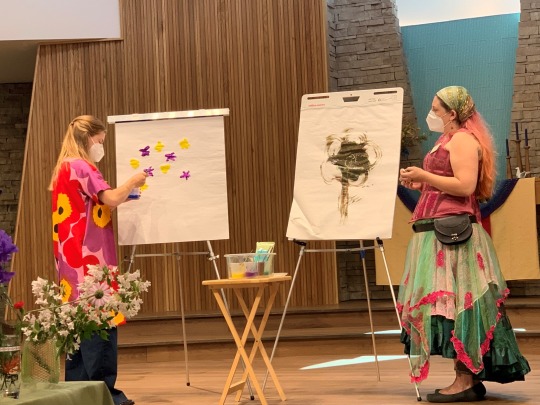
During the service everyone was invited to come to the table containing a flower and take one other than the one they had brought. It was a touchingly beautiful service and we all left with a reminder of the power of hope and courage.
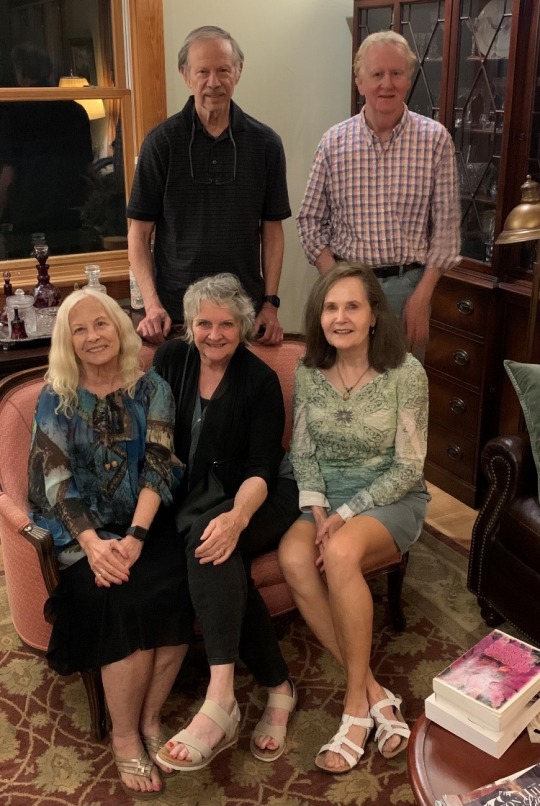
This evening we went to a potluck at our friends Barbara and Mark’s house in North Boulder. Our other friends, Shoni and Gary, were there too. Barbara, Shoni and I met MANY years ago at a Boulder Business and Professional Women’s meeting and have been friends ever since. Our husbands joined our friendship over the years. We had a tour of Barbara and Mark’s remodeled house and yard and we were lucky that the weather was good enough, at least at first, to eat outside. It did begin to rain when we were finishing so we went inside to have dessert there.
0 notes
Text
Both was possible, I think, but I feel like most often it was more like an international "deal": For example, when Napoleon created the "Légion d'Honneur", he sent a certain number of decorations to the Prussian court. (In early 1805, Prussia and France were still best buddies. At least officially.) Prussia sent an equal number of "order of the Black Eagle" to France. Some went to people who had had connections to Prussia, like Duroc who had been in Berlin as a special envoy or Bernadotte who had governed Hannover. But Murat also received one, and I'm unaware of any special connection to Prussia at the time.
It's interesting that in Berlin, the Prussian king could have distributed the French "crosses" as he saw fit. But he didn't and left the distribution to the French ambassador instead. So I guess giving a decoration to some foreign dignitary was also a question of "Whom do I want to commit to gratitude for the future?"
But it could happen rather spontaneously as well, especially for the lesser decorations of smaller countries. General Montbrun received one when he spent some time in Munich after the battle of Wagram. He had of course contributed to the French victory in that war, and that victory had liberated Bavaria once more from Austrian occupation. But he still probably received the order on behalf of all other generals, simply because he was there and met the king. I've translated the story here.
Alright uhm I'm struggling to understand the medals that the marshals have
Here some examples of what im talking about:



I have tried searching it up but I'm always hit with a big wall of text that sometimes doesn't even explain how and when these medals are earned it just talks about how they're made which is interesting but that's not what I'm trying figure out
I've come here to ask for a simple answer to my question so that I can use this info for my oc
But seriously I have like a language disorder so it would help if anyone could just explain the importance of those medals In short text that I can understand.
60 notes
·
View notes
Text
A Penguin By Any Other Name
[Apparently it has become my habit to speculate on the origins of characters’ names if they have Jewish associations (see also here and here). Also on AO3.]
“Oswald Cobblepot,” Ed said thoughtfully, rolling the syllables around his mouth as if he were tasting an unfamiliar wine.
Oswald looked up from slathering jam on his toast (he had a sweet tooth, it seemed) with a faintly annoyed expression. “Yes, Edward Nygma?”
“It’s quite a name. Did your mother give it to you?”
Oswald stared at him, nonplussed. “You haven’t said anything about a father,” Ed explained. “So I assumed it must have been your mother’s idea.”
“Yes, my mother named me,” Oswald said shortly, then took a delicate bite from the corner of his toast.
“What was her name?”
Oswald finished chewing and swallowed his bite of toast before he replied—he always ate very decorously—fixing Ed with a suspicious gaze all the while. “Why do you want to know?” he finally asked.
“Just curious. It’s not as if I can do her any harm,” Ed pointed out.
The muscles in Oswald’s jaw clenched at this reminder, and for a moment he looked as if he wanted to jump at Ed, but he just looked down into his mug of tea. “No, I suppose not,” he said tightly. “Her name was Gertrud.”
“Gertrud Cobblepot,” Ed tried. “Also quite a name.”
“Gertrud Kapelput, actually.”
Ed raised his eyebrows. “You changed your surname?”
“No, she did. She thought it would help me to have a name that sounded as English as possible.”
“Well, ‘Oswald Cobblepot’ certainly succeeds at that.”
“Oswald Chesterfield Cobblepot,” Oswald amended, with a twitch of a smile.
“Wow—very English. Where did the ‘Oswald’ and ‘Chesterfield’ come from?”
“I think she found ‘Oswald’ in a book… she said she liked that it was an aristocratic English name, because it sounded like ‘Ostwald,’ which was her mother’s maiden name. She saw ‘Chesterfield’ in a magazine and just thought it sounded distinguished.”
“Isn’t that a furniture company or something?”
“Yes. They make sofas. It’s also a town in England, apparently. I looked it up once. It’s in Derbyshire, wherever that is.” He pronounced it incorrectly, like the hat plus the place where Hobbits live.
“North-west midlands,” Ed recalled, picturing a map in his head.
Oswald rolled his eyes. “Whatever that means.”
“Ostwald is German for ‘east woods.’”
“Yes.”
“I found you in the east woods.”
“What an interesting coincidence,” Oswald said insincerely. He took a long sip of tea.
“Curious that your mother changed your surname but not her own.”
“She still had a foreign accent. What good would an English name do?”
“Fair point. A German accent? Austrian?”
“She was from Hungary… but her accent was more Yiddish than anything.” Oswald stared at Ed as if daring him to say the wrong thing.
“Hmm. Kapell means ‘chapel’ in German; Pütt means a pit or a mine. So Kapelput means ‘chapel pit.’ A crypt? Or a mine near an old chapel, maybe. That seems more likely, if it’s a Jewish name.”
Oswald shrugged. “She said her family didn’t know where the name came from.”
“Did you know, it wasn’t the Jewish tradition to have hereditary surnames? They used patronymics: son or daughter of someone. People still do that in Iceland. But in the eighteenth century, civil authorities in European states started requiring everyone to have a surname that they shared with their whole family. Easier for census and taxation purposes. So Ashkenazi Jews had to make up their own surnames. Some people just turned a patronym into a family name, like Mendelssohn or Jacobson, and some used the conventional method of naming themselves for their occupation—butcher, tailor, goldsmith, or what have you. But a lot also used place names. Sometimes the city or country they were from—like Berliner, Landau, Unger, Deutscher—but often just a local landmark near where they lived. That’s why so many Jewish names end with -berg, which means mountain; or -feld, which is field; -thal, valley; or -wald, of course. Kapelput could be one of those.”
“How do you know all that?” Oswald demanded, eyes narrowed. “You’re not Jewish, are you?”
“No. I just heard it in a radio story once. I like to listen to the radio while I work—news, stories, quizzes, not music. It helps me focus. And I retain facts.”
“Including facts about penguins, apparently.”
Ed’s face split into a wide grin, without his quite intending it. “You remembered our first meeting.”
Oswald pulled his mouth into an exaggerated frown, a kind of facial shrug. His face was always so expressive. “It was fairly memorable. Most people don’t introduce themselves to me in quite that way.”
“No, I wouldn’t think so.”
“And what about your name, Edward Nygma?” Oswald asked pointedly. “I don’t think I’ve ever heard that last name before.”
“No, you wouldn’t have, because I made it up.”
“Of course. A man who loves riddles wouldn’t just happen to be named ‘E. Nygma’ by chance.” He smirked and took another prim bite of toast.
“Though a boy named E. Nygma would be more likely than chance to end up loving riddles.”
“Or hating them,” Oswald added, after swallowing. “Why did you change your name? Clearly you weren’t going for something that sounds English…”
Ed looked down and his hands clenched. Well, really, you should have expected that, the bolder version of his own voice drawled in his head. You’re the one who started the conversation about names.
“Had a falling-out with my parents,” he said shortly. Understatement, much? the brazen voice interjected with a snort.
“Ah. I’m sorry,” Oswald said with surprising delicacy.
“Don’t be,” Ed said brightly, forcing a smile. “No attachments means no weaknesses, remember?”
“Right, of course.” Oswald’s answering smile seemed just as forced.
“New name, new start. You became a different person when you became ‘the Penguin,’ right?”
“Yes, I suppose I did. When I stopped hating the name, anyway.”
“You made it yours, so it couldn’t hurt you anymore. You chose to become that name.”
“I guess we’ve both chosen our own names, in that respect.”
What, are we going to reclaim ‘Riddle Man’ now? ‘Psychopath’? ‘Freak’?
“And why not?” Ed retorted. “We’re free, aren’t we? We can be whoever we want.”
Oswald hummed noncommittally into his tea. They both knew that neither of them really believed that—that the names of Kristen Kringle and Gertrud Kapelput would be carved into their hearts forever, as much a part of them as their own names, and they had no choice in the matter at all.
#sorry everyone#it's getting bad#gotham fic#nygmobblepot fic#jewish oswald cobblepot#glad to see that's a tag#jewish character headcanons#gertrud kapelput#oswald cobblepot and edward nygma#you can read it shippy if you squint#oswald cobblepot#edward nygma
40 notes
·
View notes
Text
Let’s play a lit game. Guess which of these 1700s/early 1800s Italian poets is who
The one who went to work abroad and refused to learn the language his whole life, forcing his imperial employer to learn his, writing all his work of 50+ years in Italian and keeping only a few select also Italian friends;
The one who founded a nowadays still existing academy for scholars and then ditched it when it started veering off path from what he intended;
The one who 99% of the time wrote poems about his imaginary muse, an older woman he supposedly had the hots for since he was a kid;
The one who chose violence and wrote about her emotionally cheating husband fixated on a past lover when everyone else liked to write about frivolous love and picnics;
The one who wrote such an important treatise on the justice system it was used as the basics to reform most European law codes but bailed on his first trip abroad to discuss it and refused to go see the tsarina because Saint Petersburg was too cold;
The three brothers–two who founded a lit circle whose discussions ended in fistfights, the older one paid n.5′s travel expenses and sent the middle one to make sure n. 5 didn’t make a fool of himself in front of the French senpais that had finally noticed them. Middle one failed and went on to England on his own. Youngest one is rumored to be the bio dad of the first Italian novelist, who’s also n.5′s grandkid;
The one who was born poor and worked as a preceptor, fought with his first employers and quit, wrote an extremely successful callout poem about nobility, tutored the guy who became the father figure of First Novelist Guy, and managed to keep his government job through two power shifts because he was just that good of an admin;
The one who was born filthy rich but fucking hated any power hierarchy and any stupid hypocritical enlightened monarch, wrote a fuck you for everyone he could manage including that sellout of n.1 who whored his poetry out to the Austrian tyrants, looked Frederick II the Great right in the eye and found him lacking, loved the French revolutionists at first but decided they’d become filthy tyrants themselves once they started killing everyone and made a mad escape from France, and wrote an autobiography that is frankly fucking hilarious;
N.8 and n.7 fanboy that never properly settled, changing city depending on the government, and preferred self exiling and dying in poverty abroad rather than work for the Austrian occupants that offered him a job;
The one who stayed up at night to read n.8′s autobiography and then got so excited he wrote a sonnet about it even if he frigging hated sonnets and said he’d never write one. This poor sod was the most depressed sickly guy in the history of Italian literature, tried to run away from home but his overprotective dad busted his plan, had a thousands of pages long notebook, said poetry comes from pain and that half seen things are better than whole things because he was obviously biased by being a wet rag of a man that died young. I still love him;
“Fuck you, and fuck you, and fuck you, fuck you very popular organization, fuck you icon of literature, fuck you main cultural event of my century, and fu–no you’re cool actually–fuck you instead, and fuck you, and what’s this? Schadenfreude? For getting to say the ultimate fuck you to a very popular guy for criticizing my blorbo? Enjoyable. And fuck you. All my friends are important people. Fuck my family.”
#italian literature#italian poets#italian illuminism#here are the hints:#vittorio alfieri#metastasio#Giambattista zappi#Faustina maratti#pietro verri#Alessandro verri#giovanni verri#cesare beccaria#ugo foscolo#giacomo leopardi#giuseppe parini#gianvincenzo gravina#and another hint is that First Novelist Guy is Alessandro Manzoni#giuseppe baretti
23 notes
·
View notes
Text
Jewish History Time!!!!!! 🕥
Hiiiiii
The Yiddish term for town, shtetl commonly refers to small market towns in pre–World War II Eastern Europe with a large Yiddish-speaking Jewish population. While there were in fact great variations among these towns, a shtetl connoted a type of Jewish settlement marked by a compact Jewish population distinguished from their mostly gentile peasant neighbors by religion, occupation, language, and culture. The shtetl was defined by interlocking networks of economic and social relationships: the interaction of Jews and peasants in the market, the coming together of Jews for essential communal and religious functions, and, in more recent times, the increasingly vital relationship between the shtetl and its emigrants abroad (organized in landsmanshaftn).
No shtetl stood alone. Each was part of a local and regional economic system that embraced other shtetls (Yid., shtetlekh) and provincial towns. Although the shtetl grew out of the private market towns of the Polish nobility in the old commonwealth, over time a shtetl became a common term for any town in Eastern Europe with a large Jewish population: towns not owned by noblemen in Poland, as well as towns in Ukraine, Hungary, Bessarabia, Bucovina, and the Subcarpathian region that attracted large-scale Jewish immigration during the course of the nineteenth century.
For all their diversity, these shtetls in Eastern Europe were indeed markedly different from previous kinds of Jewish Diaspora settlement in Babylonia, France, Spain, or Italy. In those other countries, Jews had lived scattered among the general population or, conversely, inhabited a specific section of town or a Jewish street. Rarely did they form a majority. This was not true of the shtetl, where Jews sometimes comprised 80 percent or more of the population. In many shtetls, Jews occupied most of the town, especially the streets grouped around the central marketplace. Poorer Jews would live further from the center and the frequently agrarian gentiles would often be concentrated on the peripheral streets, in order to be closer to the land that they cultivated.
This Jewish life in compact settlements had an enormous psychological impact on the development of East European Jewry—as did the language of the shtetl, Yiddish. Despite the incorporation of numerous Slavic words, the Yiddish speech of the shtetl was markedly different from the languages used by Jews’ mostly Slavic neighbors. While it would be a great mistake to see the shtetl as an entirely Jewish world, without gentiles, it is nonetheless true that Yiddish reinforced a profound sense of psychological and religious difference from non-Jews. Suffused with allusions to Jewish tradition and to religious texts, Yiddish developed a rich reservoir of idioms and sayings that reflected a vibrant folk culture inseparable from the Jewish religion.
The shtetl was also marked by occupational diversity. While elsewhere in the Diaspora Jews often were found in a small number of occupations, frequently determined by political restrictions, in the shtetl Jewish occupations ran the gamut from wealthy contractors and entrepreneurs, to shopkeepers, carpenters, shoemakers, tailors, teamsters, and water carriers. In some regions, Jewish farmers and villagers would be nearby. This striking occupational diversity contributed to the vitality of shtetl society and to its cultural development. It also led to class conflict and to often painful social divisions.
The experience of being a majority culture on the local level, sheer numbers, language, and occupational diversity all underscored the particular place of the shtetl as a form of Jewish Diaspora settlement.
Shtetls developed in the territories of the old Polish Commonwealth, where the nobility encouraged Jews to move onto estates in order to stimulate economic development. The eastward expansion of the commonwealth after the Union of Lublin in 1569 coincided with a growing market in Western and Central Europe for timber, grain, livestock and hides, amber, furs, and honey. Eager to develop their estates, the nobles needed competent managers and entrepreneurs—as well as regular markets and fairs. Jews were suitable instruments, especially because they could never become potential political rivals. thus developed the arenda (leasing) system, in which landlords leased key economic functions to a Jewish arendar (agent). Arenda usually included extensive subleasing, which further encouraged Jewish immigration to the landed estates. The manufacture and sale of alcoholic beverages—largely in Jewish hands—was particularly important as it gave landlords an important hedge against falling grain prices in export markets.
Noble magnates established private market towns and sought to attract Jews to reside in them. Economic competition from Christians in older cities in western and central Poland, as well as Jew-hatred fanned by the church and by guilds, also stimulated Jewish migration to the shtetls in the less-developed eastern regions of the commonwealth (today’s eastern Poland, Ukraine, Belarus, and Lithuania). These new towns—all centered on a market square—reflected an emerging symbiosis of nobles, Jews, and the surrounding peasantry. One side of the market would often feature a Catholic church, built by the local landlord as a symbol of primacy and ownership, with a synagogue on the other side. The weekly market days brought together Jews and peasants and created a web of relationships that were both economic and personal. Usually the landlords granted charters that precluded market days and fairs on the Sabbath or on Jewish holidays. The shtetls—with their synagogues, schools, ritual baths, cemeteries, and inns—also served as a base for the numerous dorfsgeyer, that is, Jews who would fan out to the villages as carpenters, shoemakers, and agents. Many Jews who lived lonely lives in the countryside as taverners, innkeepers, or leaseholders could come to the shtetl for major holidays and important family occasions.
While some shtetls date from the sixteenth century, the peak of shtetl development occurred after the 1650s, following the ravages of gzeyres takh vetat (the Khmel’nyts’kyi uprising) and the Swedish invasion. The nobility made a concerted effort to recoup their economic standing by establishing new market towns. The development of these shtetls coincided with an enormous demographic increase of Polish Jewry. While the Polish–Lithuanian Jewish population stood at perhaps 30,000 in 1500, by 1765 it had expanded to about 750,000. A striking feature of this Jewish settlement was its marked dispersion. By the 1770s, more than half of Polish Jews lived in hundreds of private towns owned by the nobility: about one-third lived in villages. In many Polish cities, Christian guilds and the Catholic Church fought to curtail Jewish residence rights.
With the collapse of the Polish Commonwealth in the late eighteenth century, the world’s largest Jewish community passed under Russian, Prussian, and Austrian rule. The anti-Russian Polish revolts of 1830–1831 and 1863 severely weakened the Polish nobility, and thus their Jewish partners. Nobles also suffered from the abolition of serfdom. The building of railroads and the rise of major urban centers helped create new regional and national markets that undercut the economic base of many shtetls. New peasant movements questioned the Jewish role in the rural economy and started cooperatives that undercut the shtetl. Moreover, progressive urbanization of peasants and the movement of Jews to the great cities that commenced in the second half of the nineteenth century meant that Jews became a minority in many towns where they had formerly predominated. In Galicia, shtetls suffered from economic pressures, but on the whole, Jews—especially after 1848 and 1867—benefited from a more liberal political regime. This was not the case in the Pale of Jewish Settlement in the Russian Empire.”


#israel#Jewish#Jumblr#Yiddish#Yiddishkheit#know ur history or else ur gonna be dumb afffff#israeli conflict#land#this is why we need Jewish communes and everyone in the universe who isnt already - to be hippies
169 notes
·
View notes